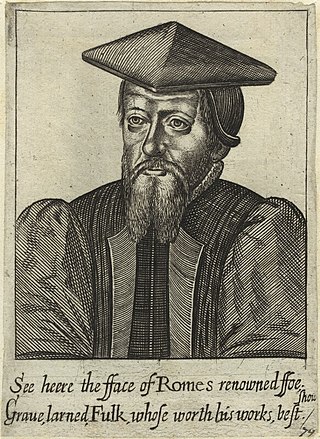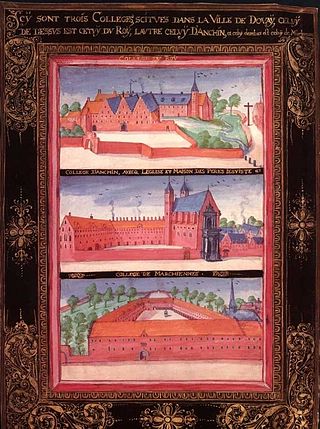Related Research Articles

Robert Persons, later known as Robert Parsons, was an English Jesuit priest. He was a major figure in establishing the 16th-century "English Mission" of the Society of Jesus.

William Allen, also known as Guilielmus Alanus or Gulielmus Alanus, was an English Cardinal of the Roman Catholic Church. He was an ordained priest, but was never a bishop. His main role was setting up colleges to train English missionary priests with the mission of returning secretly to England to keep Roman Catholicism alive there. Allen assisted in the planning of the Spanish Armada's attempted invasion of England in 1588. It failed badly, but if it had succeeded he would probably have been made Archbishop of Canterbury and Lord Chancellor. The Douai-Rheims Bible, a complete translation into English from Latin, was printed under Allen's orders. His activities were part of the Counter Reformation, but they led to an intense response in England and in Ireland. He advised and recommended Pope Pius V to pronounce Elizabeth I deposed. After the Pope declared her excommunicated and deposed, Elizabeth intensified the persecution of her Roman Catholic religious opponents.

The Douay–Rheims Bible, also known as the Douay–Rheims Version, Rheims–Douai Bible or Douai Bible, and abbreviated as D–R, DRB, and DRV, is a translation of the Bible from the Latin Vulgate into English made by members of the English College, Douai, in the service of the Catholic Church. The New Testament portion was published in Reims, France, in 1582, in one volume with extensive commentary and notes. The Old Testament portion was published in two volumes twenty-seven years later in 1609 and 1610 by the University of Douai. The first volume, covering Genesis to Job, was published in 1609; the second, covering the Book of Psalms to 2 Maccabees plus the three apocryphal books of the Vulgate appendix following the Old Testament, was published in 1610. Marginal notes took up the bulk of the volumes and offered insights on issues of translation, and on the Hebrew and Greek source texts of the Vulgate.

William Fulke was an English Puritan divine.
The English College was a Catholic seminary in Douai, France, associated with the University of Douai. It was established in 1568, and was suppressed in 1793. It is known for a Bible translation referred to as the Douay–Rheims Bible. Of over 300 priests from Douai sent on the English mission, about one-third were executed. The dissolution of the college at the time of the French Revolution led to the founding of Crook Hall near Lanchester in County Durham, and St Edmund's College, Ware. It is popularly believed that the indemnification funds paid by the French for the seizure of Douai's property were diverted by the British commissioners to complete the furnishings of George IV's Royal Pavilion at Brighton.

Luke Kirby was an English Catholic priest and martyr from the North of England, executed during the reign of Elizabeth I. He was is one of the Forty Martyrs of England and Wales.

Thomas Cottam was an English Catholic priest and martyr from Lancashire, who was executed during the reign of Elizabeth I.
Richard Bristow was an English Catholic controversialist and Biblical scholar.
Thomas Worthington, D.D. was an English Catholic priest and third President of Douai College.
Father Richard Holtby was an English Jesuit Superior and Roman Catholic priest.
The Archpriest Controversy was the debate which followed the appointment of an archpriest by Pope Clement VIII to oversee the efforts of the Roman Catholic Church's missionary priests in England at the end of the sixteenth century.

Thomas Stapleton was an English Catholic priest and controversialist.

The Reverend Father Gregory Martin was an English Catholic priest, a noted scholar of his time, academic and Doctor of Divinity, and served as the chief translator of the Rheims and Douai Version of the Bible, the first full, official Catholic English Bible translation, translated from the Latin Vulgate.
Maurice Clenock was a Welsh Roman Catholic priest and recusant exile. He was the first head of the English College, Rome. He was born at Llŷn or Eifionydd circa 1525 and died at sea in 1581.

The Irish College was a seminary at Douai, France, for Irish Roman Catholics in exile on the continent of Europe to study for the priesthood, modelled on the English College there. Dedicated to St. Patrick, the college was sometimes referred to as St. Patrick's College, Douai.

George Haydock was an English Roman Catholic priest. He is a Catholic martyr, beatified in 1987. He is not to be confused with his relative, also a priest, George Leo Haydock (1774–1849).
Gabriel Gifford OSB was an English Roman Catholic Benedictine monk who became Archbishop of Reims.
John Heigham was an English Roman Catholic printer, writer, and translator. He went into exile in Douai and Saint-Omer, where he married and brought up a family. A son John, who took holy orders, left Rome for the English mission in 1649.
John Dolman of Pocklington, son of Sir Thomas Dolman of Pocklington by Elizabeth Vavasour, was a catholic Jesuit, witness of the persecution of Saint Edmund Campion.
John Hart was an English Jesuit, known for his equivocal behaviour on the English mission in the early 1580s.
References
- . Dictionary of National Biography . London: Smith, Elder & Co. 1885–1900.
- Attribution
![]() This article incorporates text from a publication now in the public domain : "Ely, Humphrey". Dictionary of National Biography . London: Smith, Elder & Co. 1885–1900.
This article incorporates text from a publication now in the public domain : "Ely, Humphrey". Dictionary of National Biography . London: Smith, Elder & Co. 1885–1900.